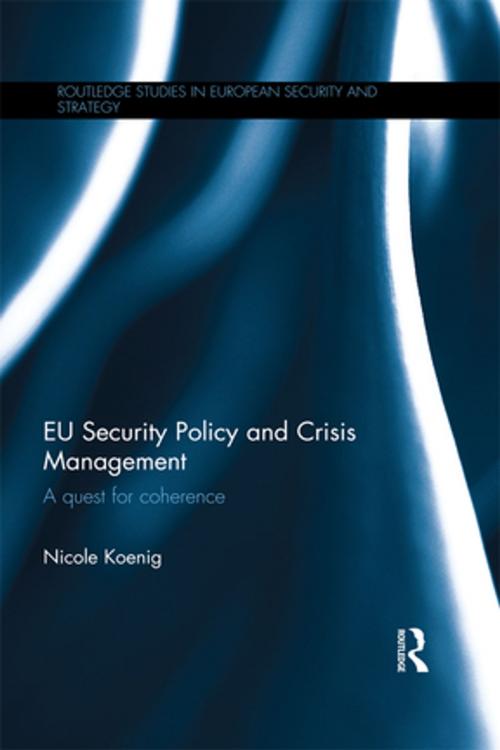EU Security Policy and Crisis Management
A Quest for Coherence
Nonfiction, Social & Cultural Studies, Political Science, International, International Security, History, Africa| Author: | Nicole Koenig | ISBN: | 9781317335290 |
| Publisher: | Taylor and Francis | Publication: | March 10, 2016 |
| Imprint: | Routledge | Language: | English |
| Author: | Nicole Koenig |
| ISBN: | 9781317335290 |
| Publisher: | Taylor and Francis |
| Publication: | March 10, 2016 |
| Imprint: | Routledge |
| Language: | English |
This book explores European Union crisis management and draws implications for its role as an international security actor.
The success of EU crisis management has varied greatly and this book aims to identify the key factors that explain the differing degrees of coherence through a comparative analysis of its multidimensional crisis responses in Africa. The empirical focus lies on three prominent EU crisis management cases, namely Libya in 2011, Somalia in 2011-2012, and the Sahel in 2012-2013. It analyses the activities and interaction of EU institutional actors and member states, with a focus on France, the United Kingdom, and Germany. The book argues that the EU represents a rather unpredictable security actor, whose multi-level coherence is contingent on the congruence of domestic economic and electoral interests, as well as national threat perceptions, and the extent to which EU-level coherence norms resonate with national norms on the use of force and modes of multilateral cooperation. In sum, this book offers systematic insight into EU crisis management and clarifies the conceptual and empirical boundaries of the comprehensive approach. Finally, the study of the micro-foundations of coherence allows for policy-relevant suggestions on the EU’s future role as a security actor.
This book will be of much interest to students of EU policy, European Security, Peace and Conflict Studies, African Politics and IR in general.
This book explores European Union crisis management and draws implications for its role as an international security actor.
The success of EU crisis management has varied greatly and this book aims to identify the key factors that explain the differing degrees of coherence through a comparative analysis of its multidimensional crisis responses in Africa. The empirical focus lies on three prominent EU crisis management cases, namely Libya in 2011, Somalia in 2011-2012, and the Sahel in 2012-2013. It analyses the activities and interaction of EU institutional actors and member states, with a focus on France, the United Kingdom, and Germany. The book argues that the EU represents a rather unpredictable security actor, whose multi-level coherence is contingent on the congruence of domestic economic and electoral interests, as well as national threat perceptions, and the extent to which EU-level coherence norms resonate with national norms on the use of force and modes of multilateral cooperation. In sum, this book offers systematic insight into EU crisis management and clarifies the conceptual and empirical boundaries of the comprehensive approach. Finally, the study of the micro-foundations of coherence allows for policy-relevant suggestions on the EU’s future role as a security actor.
This book will be of much interest to students of EU policy, European Security, Peace and Conflict Studies, African Politics and IR in general.















